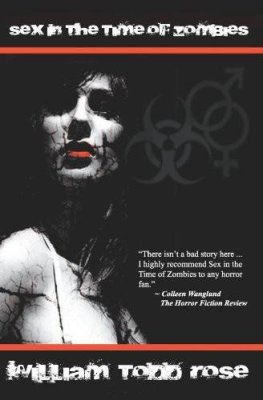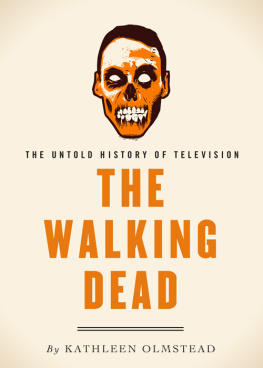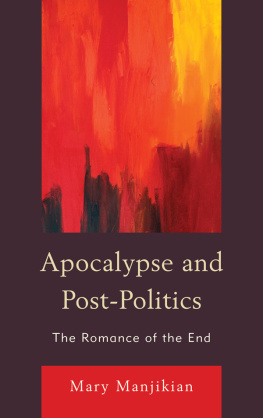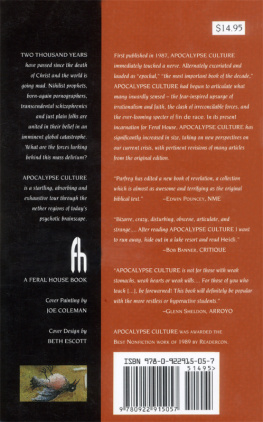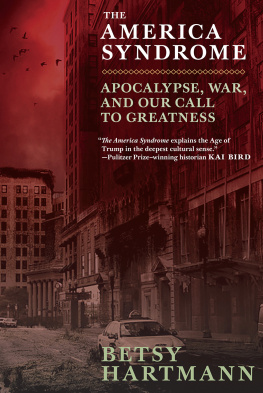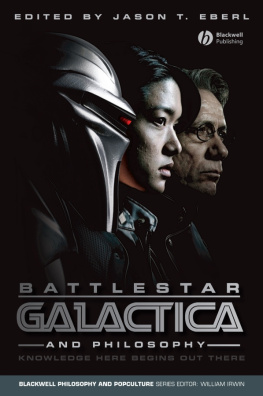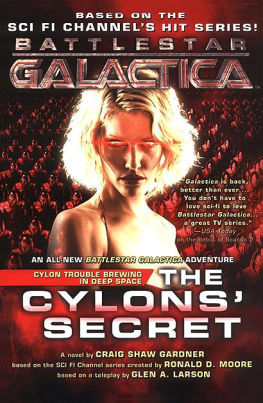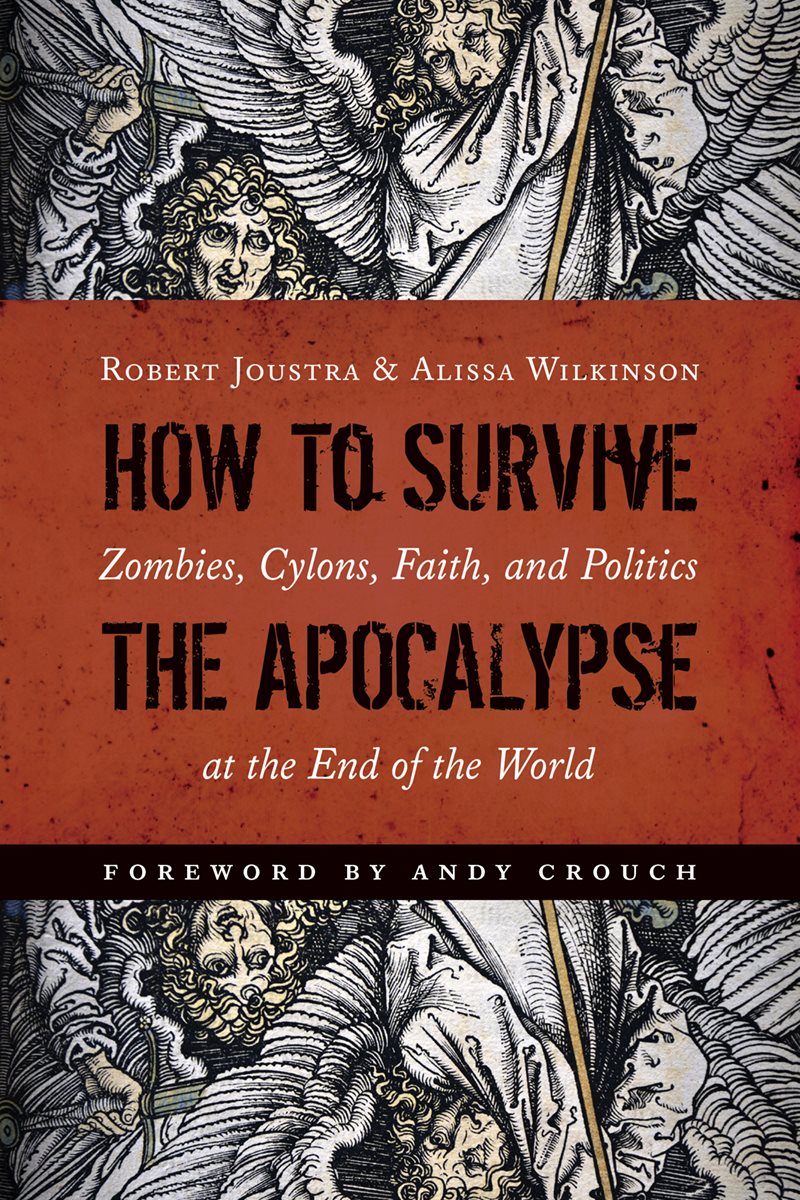Robert Joustra and Alissa Wilkinson insist the end is not near; its already here, in the zeitgeist, even if the zombies and robot overlords are still at bay. With philosopher Charles Taylor as their guide, they cast a keen eye on how apocalyptic visions in recent popular culture reflect our rootless search for authentic selves in a secular age. But they also leave us with a compelling alternative to defeatism in the face of the end times a clear-eyed pluralism rooted in the building of faithful institutions.
Kevin R. den Dulk
director of the Henry Institute,
Calvin College
With style and skill, Wilkinson and Joustra demonstrate that popular entertainment tells us something deeply important about ourselves. As our guides on a wide-ranging tour with an itinerary that includes Charles Taylor, Parks and Recreation, and modern political philosophy among many other stops, they lead us to a place where our participation as citizens is wholeheartedly encouraged and affirmed.
Stephanie Summers
CEO of the Center for Public Justice
All too often, books on pop culture by Christian scholars, pastors, and theologians lapse into the what to think category. Whats different about reading How to Survive the Apocalypse is that we understand better why were seeing what were seeing. Thats because a political philosopher (Joustra) and a cultural critic (Wilkinson) are probably in better position to guide us as to how our secular age has become perennially obsessed with the fantasy of the end of the world.
Gregory Alan Thornbury
president of The Kings College
How to Survive
the Apocalypse
Zombies, Cylons, Faith, and Politics
at the End of the World
Robert Joustra & Alissa Wilkinson
William B. Eerdmans Publishing Company
Grand Rapids, Michigan
2016 Robert Joustra and Alissa Wilkinson
All rights reserved
Published 2016 by
Wm. B. Eerdmans Publishing Co.
2140 Oak Industrial Drive N.E., Grand Rapids, Michigan 49505
Printed in the United States of America
Library of Congress Cataloging-in-Publication Data
Names: Joustra, Robert, author. | Wilkinson, Alissa, author.
Title: How to survive the Apocalypse: zombies, cylons, faith, and politics
at the end of the world / Robert Joustra & Alissa Wilkinson.
Description: Grand Rapids, Michigan: Eerdmans Publishing Company, 2016. |
Includes bibliographical references.
Identifiers: LCCN 2016002487 | ISBN 9780802872715 (pbk.: alk. paper)
eISBN 9781467445290 (ePub)
eISBN 9781467444828 (Kindle)
Subjects: LCSH: End of the world.
Classification: LCC BT877 .J68 2016 | DDC 236 dc23
LC record available at http://lccn.loc.gov/2016002487
www.eerdmans.com
Contents
4. Keep Calm and Fight the Cylons:
New Ways to Be Human
5. Remember My Name:
Antiheroes and Inescapable Horizons
6. A Lonely Man, His Computer,
and the Politics of Recognition
7. Winter Is Coming:
The Slide to Subjectivism
10. May the Odds Be Ever in Your Favor:
Learning to Love Faithful Institutions
To begin, a confession:
Of the many artifacts of popular visual culture discussed in this marvelously wide-ranging and provocative book, I have seen hardly a single one. No Game of Thrones. No House of Cards. No Mad Men or The Walking Dead or Breaking Bad either.
My nearly complete ignorance, at least firsthand, of these works is first of all a matter of time. TV requires a lot of it, which I never seem to have. One of the many things that astonishes me about Alissa Wilkinson and Rob Joustra is that they manage to maintain lives as professors, family members, friends, and writers and also actually watch all these hours of television, with critical attention and intelligence to boot!
And I have to admit that another reason I have not engaged with these dystopian, apocalyptic series that so define our cultural moment is that, well, my imagination is dystopian and apocalyptic enough on its own, thank you very much.
But after reading this book, I have a far deeper appreciation for all these works of popular art, and a sense that Ive been missing out. Does that mean Im going to binge-watch Mad Men this weekend, or ever? Probably not. But it does heighten my awareness of just how much is happening, of real significance, in popular culture Id venture to say, more than at any other point in my adult life.
As our political and educational institutions have waned in their ability to address the question of how we human beings live together in spite of all our differences the question, that is, of politics and what this world all really means, our storytellers have taken up the slack. And theyve done so using media that require a lot of time and attention multi-volume works of fantasy and fiction, multi-season television shows, feature films. Weve come a long way from the sitcoms 22 minutes of easy-watching trivia. The artists who produce the most widely influential works of our time can count on audiences willing to invest hours, even days, of their lives in stories that probe our present condition and our probable futures.
If this book merely introduced laggards like me to the excellences available in this golden age of TV, it would be worthwhile. But it is also an extended critical meditation on the work, above all, of the philosopher Charles Taylor (along with his theologically minded interpreter James K. A. Smith and the incomparable political theologian Oliver ODonovan).
And so I might as well offer another confession: For all Taylors importance, and for all my eager reading of Smith and ODonovan, Ive never managed to actually finish either of Taylors magna opera Sources of the Self and A Secular Age. Like a past presidential candidate in the U.S. who said, in an unintentional double entendre, that he tried to read Platos Republic every year, I have many times started each of these books and many times found myself distracted by something easier. Like, say, learning Sanskrit, mastering the Japanese game of Go, or building a 1/100-scale replica of the city of Amsterdam in my basement.
So you could say Im the least qualified person you could imagine to commend this book to you. Or maybe it makes this endorsement more compelling: few books have made me think as carefully about the question of what it means to be a citizen someone who takes seriously their responsibility as a member of a political community and what it means to be a Christian at the same time.
I might offer one observation of my own by way of ushering you into this book. It is truly striking how enduring the idea of apocalypse remains, just when youd think our age would have put such notions to rest a reminder of the cross pressures, as Taylor would say, that buffet even the most seemingly secure secularist. But Ive noticed something about many of these works of serial drama, whether they are set after a grand reversal of history or seem teetering on the edge of one: it seems like their creators have a very hard time coming up with truly satisfying endings.
Some of this is due, to be sure, to the economics of serial television, which has every incentive to keep its viewers on the hook and to keep its producers uncertain of whether they will get funds for another season. But it also seems judging from the tepid reactions to the finales of any number of recent series, from Lost to The Sopranos to Breaking Bad that writing truly satisfying endings is an elusive goal, even when your central theme is the end of the world.
We dont actually just want an end we want a judgment. We dont just want things to collapse we want them to be set right. The human heart is not satisfied with final indifference the prospect that neither damnation nor redemption awaits us or any other member of our haunted species. We want them in our stories, even if the world seems to offer neither one.


